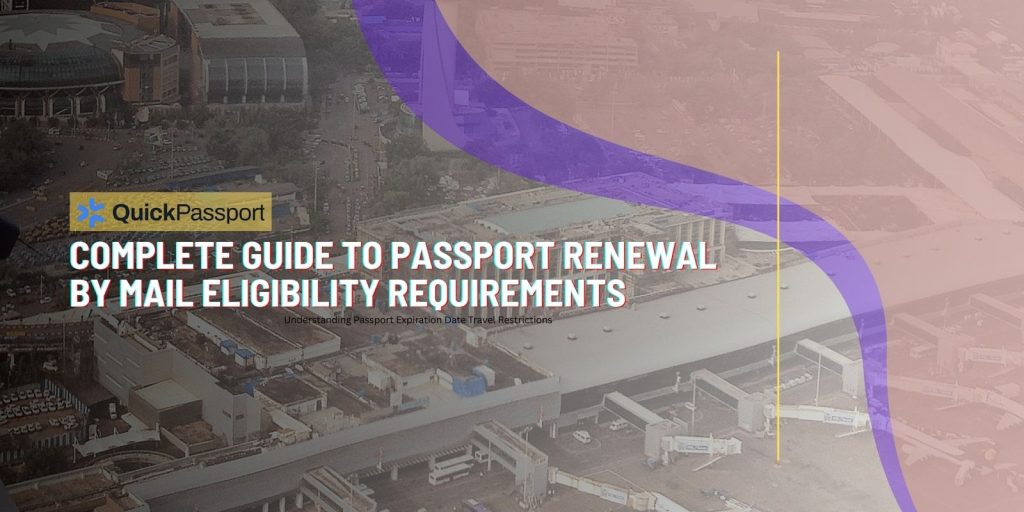Understanding passport renewal by mail eligibility requirements can save you significant time and effort when updating your travel documents. The convenience of mailing your renewal application versus scheduling an in-person appointment makes this option highly desirable for eligible applicants. However, strict federal requirements determine who qualifies for this streamlined process.
Overview
This comprehensive guide explains every aspect of passport renewal by mail eligibility, including the specific criteria you must meet, required documentation, and common disqualifying factors. We’ll walk through Form DS-82 requirements, examine situations that require in-person renewal, and provide expert insights on navigating complex eligibility scenarios. You’ll also discover how professional services can verify your eligibility and ensure your mail renewal application meets all federal standards for successful processing.
Key Takeaways
- Age requirement mandates your previous passport was issued when you were 16 years old or older
- Timeline restriction limits mail renewal to passports issued within the past 15 years
- Condition standards require your previous passport to be undamaged and submitted with your application
- Name consistency means any name changes since your last passport disqualify you from mail renewal
- Form DS-82 is the specific application form required for all mail renewals
- Professional verification helps determine eligibility and prevents costly application mistakes
Understanding Mail Renewal Eligibility Basics
TheU.S. State Department established specific criteria that determine eligibility for passport renewal by mail. These requirements ensure the integrity of the passport system while providing convenience for qualifying applicants. Understanding each criterion prevents application delays and ensures you choose the correct renewal method.

Primary eligibility factors include age at issuance, time since issuance, passport condition, and name consistency. All criteria must be met simultaneously for mail renewal qualification. If any single requirement is not satisfied, in-person renewal becomes necessary regardless of how many other criteria you meet.
The mail renewal process streamlines document processing for straightforward cases where identity verification and citizenship have been previously established. This system reduces the burden on passport acceptance facilities while maintaining security standards. However, the strict eligibility requirements ensure that only appropriate cases receive this expedited handling.
Security considerations drive many eligibility restrictions. The State Department must balance convenience with fraud prevention, leading to conservative eligibility criteria. Cases involving name changes, damaged documents, or extended time periods require additional verification that can only be conducted through in-person processing.
Age at Issuance Requirements
Sixteen years or older at the time your previous passport was issued represents the fundamental age requirement for mail renewal eligibility. This criterion ensures that adult identity verification procedures were followed during the original application process. Passports issued to minors under 16 follow different security protocols that require in-person renewal.
Verification process for age at issuance involves reviewing the issue date on your current passport and confirming your birth date. The calculation must clearly show you were at least 16 years old when the passport was originally processed. Even being 15 years and 11 months old at issuance disqualifies you from mail renewal.
Exception scenarios do not exist for the age requirement. Regardless of current age or circumstances, if your most recent passport was issued when you were under 16, in-person renewal is mandatory. This requirement applies even if you’ve held multiple passports and previous adult passports were issued when you were over 16.
TheState Department’s security protocols for minor passports include additional identity verification and parental consent requirements. These enhanced security measures cannot be replicated through mail processing, necessitating in-person renewal for all passports originally issued to minors.
Fifteen-Year Issuance Timeline
Issuance within 15 years represents the maximum time period allowed between your previous passport and renewal application. This timeline ensures that security features, photo quality, and personal information remain current and verifiable. Passports issued more than 15 years ago require complete reapplication as if applying for a first-time passport.
Calculation method for the 15-year period uses the exact issue date printed on your passport, not the expiration date. Some applicants mistakenly calculate from expiration dates, leading to incorrect eligibility determinations. The issue date appears on the passport data page and serves as the official starting point for timeline calculations.
Extended validity passports issued to certain applicants may create confusion about eligibility timelines. Some passports received extensions during processing delays or special circumstances. However, the original issue date still determines the 15-year eligibility period, regardless of any extensions or modifications made after issuance.
Grace period considerations do not extend the 15-year limit. Applications submitted even one day beyond the 15-year cutoff require in-person processing. Professional services help applicants accurately calculate eligibility periods and avoid submission of ineligible applications that result in return without processing.
Passport Condition Standards
Undamaged condition requires your previous passport to be in sufficiently good condition for submission with your renewal application. The State Department must be able to verify security features, read all printed information, and confirm the document’s authenticity. Damage that impairs these verification processes disqualifies the passport from mail renewal.

Acceptable wear patterns include minor edge fraying, slight discoloration from normal use, and light scratches that don’t obscure printed information. Normal aging and handling wear typically don’t disqualify passports if all pages remain intact and readable. However, the definition of “acceptable” remains subjective and varies by individual case review.
Disqualifying damage includes water damage, torn or missing pages, separated covers, illegible text, or damage to security features. Any alteration, whether intentional or accidental, typically requires in-person renewal. TheFederal Bureau of Investigation investigates suspected document tampering, making damage assessment crucial for security.
Professional evaluation helps determine whether passport condition meets mail renewal standards. Experienced services can assess borderline cases and recommend the appropriate renewal method. This evaluation prevents applications from being returned without processing due to condition issues.
Name Change Disqualifications
Identical names on your current passport and renewal application are required for mail renewal eligibility. Any variation in spelling, punctuation, or name order disqualifies you from this process. Even minor changes like adding or removing middle initials require in-person renewal with supporting documentation.
Marriage and divorce commonly create name change situations that prevent mail renewal. Applicants who changed names after marriage, returned to maiden names after divorce, or made any legal name modifications must renew in person. TheSocial Security Administration provides guidance on acceptable name change documentation.
Legal name changes through court orders, adoptions, or other legal proceedings all require in-person renewal regardless of the reason for the change. Supporting documentation must be provided to verify the name change and establish continuity of identity. Professional services help gather appropriate documentation for these complex cases.
Spelling corrections of names that were incorrect on previous passports also require in-person processing. Even if the correction makes the name match your birth certificate more accurately, the discrepancy between passports disqualifies mail renewal. Identity verification procedures must confirm the correction is legitimate.
Form DS-82 Application Requirements
Form DS-82 serves as the exclusive application form for passport renewal by mail. This form differs significantly from Form DS-11 used for in-person applications and includes specific sections designed for mail processing. Completing the correct form is essential for proper application processing.
Digital completion is recommended for Form DS-82 to ensure legibility and reduce processing errors. TheState Department’s fillable PDF allows electronic completion before printing and signing. Handwritten forms must be completed in black ink with clear, legible writing.
Signature requirements mandate original ink signatures on Form DS-82. Electronic signatures, stamps, or photocopied signatures are not acceptable and will result in application rejection. The signature must match government-issued identification and previous passport records.
Information accuracy is crucial for successful processing. Any discrepancies between the application form and supporting documents can delay processing or result in rejection. Professional services verify all information before submission to prevent these costly delays.
Required Documentation Package
Current passport must be submitted with your renewal application and will be cancelled upon processing of your new passport. This requirement ensures that only one valid passport exists at any time. Applicants concerned about travel plans should carefully time their renewal submission.
Passport photo requirements follow the same strict federal guidelines as first-time applications. Images must be taken within six months, measure exactly 2×2 inches, and meet specific quality standards. TheState Department photo requirements detail exact specifications that must be followed precisely.
Fee payment includes the renewal application fee, with additional costs for expedited processing if selected. Payment methods include checks or money orders made payable to the U.S. Department of State. Cash payments are not accepted for mail applications, and personal checks must clear before processing begins.
Supporting documents may be required in certain situations, such as court orders for legal name changes or evidence of citizenship for specific cases. Professional services help identify any additional documentation needs based on individual circumstances.
Situations Requiring In-Person Renewal
Damaged passports that show signs of significant wear, water damage, or structural issues cannot be renewed by mail. Assessment of damage levels can be subjective, making professional evaluation valuable for borderline cases. Any doubt about passport condition typically results in requirements for in-person renewal.
Lost or stolen passports require completely different procedures and cannot be renewed by mail under any circumstances. Form DS-64 must be filed to report the missing document, followed by Form DS-11 for in-person replacement. TheNational Passport Information Center coordinates lost passport procedures.
Minor applicants whose previous passports were issued when they were under 16 must renew in person regardless of current age. This requirement applies even to adults whose childhood passports are still within the 15-year validity period. Parental consent and identity verification procedures cannot be conducted through mail processing.
Limited validity passports issued for specific travel restrictions or emergency situations typically require in-person renewal. These special-category passports involve additional security considerations that necessitate personal appearance and document verification.
Processing Timeline Considerations
Standard mail processing takes 4-6 weeks from receipt at the processing facility, not including mailing time to and from the facility. Total processing time often ranges from 6-8 weeks when accounting for postal delivery. Planning ahead prevents travel disruptions due to processing delays.

Expedited mail processing reduces processing time to 2-4 weeks for an additional fee. This service prioritizes applications but doesn’t guarantee specific delivery dates. Expedited processing works well for planned travel with flexible dates but may not suffice for immediate travel needs.
Mailing considerations affect total turnaround time significantly. Standard postal delivery adds 1-2 weeks each direction, while expedited shipping options can reduce this timeframe. Professional services often coordinate shipping to optimize delivery schedules.
Status tracking helps monitor application progress through theState Department’s online system. Professional services provide additional communication and proactive updates throughout the processing period.
Common Eligibility Mistakes
Incorrect age calculations frequently disqualify applicants who assume they were 16 when their passport was issued without verifying exact dates. Professional verification prevents these calculation errors that result in returned applications.
Damage assessment errors occur when applicants underestimate passport damage or overestimate acceptability. Borderline condition cases benefit from professional evaluation before submission to avoid rejection.
Name variation oversights include failing to recognize minor spelling differences, punctuation changes, or name order variations. Even small discrepancies require in-person renewal with supporting documentation.
Timeline miscalculations happen when applicants count from expiration dates rather than issue dates, or fail to account for leap years in their calculations. Professional services ensure accurate eligibility determination.
Professional Service Advantages
Eligibility verification eliminates guesswork about qualification for mail renewal. Professional review of your current passport, timeline calculations, and condition assessment prevents submission of ineligible applications that waste time and money.
Document preparation ensures all required materials are complete, accurate, and properly formatted before submission. This preparation includes photo compliance verification, form completion review, and fee calculation.
Processing coordination includes expedited shipping arrangements, status monitoring, and proactive communication throughout the renewal period. Professional services handle logistics while keeping you informed of progress.
Problem resolution addresses issues that arise during processing, such as requests for additional information or clarification of application details. Professional advocacy helps resolve problems quickly and effectively.
Cost Analysis and Value
Government fees are identical whether you submit independently or through professional services. The renewal application fee and optional expedited processing fees represent fixed costs that cannot be reduced regardless of submission method.
Service value includes time savings, error prevention, and peace of mind throughout the renewal process. Professional services eliminate multiple trips to post offices, prevent costly resubmissions due to errors, and provide expertise that ensures successful processing.
Hidden costs of independent applications include potential photo retakes, expedited shipping fees, and time off work to handle problems that arise during processing. Professional services provide transparent pricing that includes comprehensive support.
Risk mitigation prevents common mistakes that delay processing or result in application rejection. The cost of professional services often proves less than the expenses associated with correcting errors in independent applications.
Special Circumstances and Complex Cases
Military personnel stationed overseas may have unique eligibility considerations based on where their previous passport was issued and current duty location. Military postal systems and APO addresses require special handling procedures.
Dual citizens must ensure their renewal application doesn’t conflict with obligations to other countries. Some nations restrict dual citizenship or require notification of passport changes. Professional services help navigate these complex international requirements.
Previous expedited processing doesn’t affect current eligibility but may influence processing expectations. Applicants who received expedited service previously should understand that each application is processed independently.
International residence may complicate mail renewal for U.S. citizens living abroad. Mailing addresses, shipping restrictions, and delivery timelines require special consideration for overseas applicants.
Common Questions About Passport Renewal by Mail Eligibility Requirements
What are the basic eligibility requirements for passport renewal by mail?
You must have been 16 or older when your current passport was issued, received it within the past 15 years, have it in undamaged condition to submit, and have the same name as on your current passport. All four criteria must be met simultaneously for mail renewal eligibility.
Can I renew by mail if my name changed after marriage?
No, any name change since your previous passport was issued disqualifies you from mail renewal. Marriage name changes require in-person renewal with your marriage certificate and other supporting documentation to verify the name change and establish identity continuity.
How do I calculate if my passport was issued within 15 years?
Use the exact issue date printed on your passport data page, not the expiration date. Count 15 years from that issue date to determine eligibility. Even one day beyond 15 years requires in-person renewal rather than mail processing.
What level of passport damage disqualifies mail renewal?
Significant water damage, torn or missing pages, separated covers, illegible text, or damage to security features all disqualify mail renewal. Minor edge wear and light scratches are typically acceptable if all information remains clearly readable.
Can I renew by mail if my previous passport was issued when I was 15?
No, you must have been exactly 16 years old or older when your previous passport was issued. Being 15 years and any number of months old at issuance requires in-person renewal regardless of your current age.
What happens if I submit a mail renewal application but don’t qualify?
Ineligible applications are returned without processing along with an explanation of why you don’t qualify for mail renewal. You’ll need to reapply using Form DS-11 for in-person processing, which will delay receiving your new passport.
Do I need to submit my current passport with a mail renewal application?
Yes, your current passport must be submitted with Form DS-82 and will be cancelled when your new passport is processed. This ensures only one valid passport exists at any time and allows verification of your previous passport details.
Can professional services determine my eligibility for mail renewal?
Yes, professional passport services can review your current passport, verify timeline calculations, assess document condition, and confirm name consistency to determine eligibility. This verification prevents submission of ineligible applications that result in delays.
How long does mail renewal processing take?
Standard mail renewal processing takes 4-6 weeks from receipt at the processing facility, plus mailing time. Total turnaround often ranges 6-8 weeks. Expedited processing reduces facility time to 2-4 weeks but doesn’t eliminate mailing time.
What forms do I need for passport renewal by mail?
Form DS-82 is the only application form used for mail renewal. This form is different from Form DS-11 used for in-person applications and includes specific sections designed for mail processing verification and handling.
Making the Right Renewal Choice
Understanding passport renewal by mail eligibility requirements empowers you to choose the most efficient renewal method for your situation. The convenience of mail processing makes it highly desirable when you qualify, but strict federal criteria ensure that only appropriate cases receive this streamlined handling. Professional verification eliminates uncertainty and prevents costly mistakes that delay your passport renewal.
QuickPassport Seattle provides expert eligibility verification and comprehensive renewal services for all types of passport situations. Whether you qualify for convenient mail renewal or require in-person processing, our experienced team ensures your application meets all federal requirements for successful, timely processing. Let our Smart, Expedited, and Priority services handle your renewal needs while you focus on planning your next international adventure.






